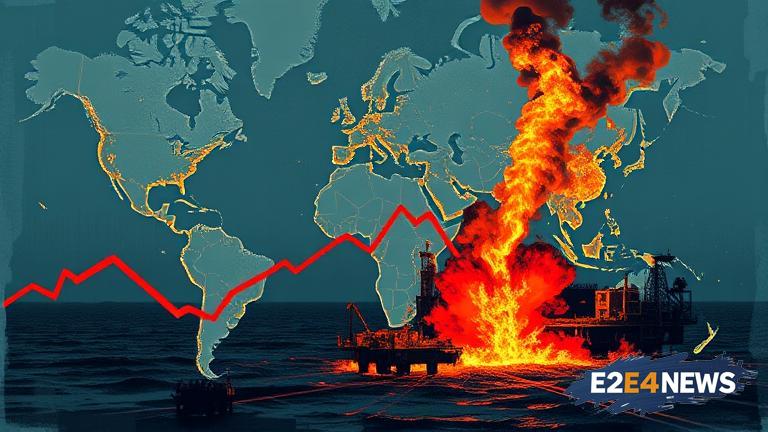The global oil market has witnessed a significant surge in prices over the past four days, primarily driven by fears of supply disruptions stemming from the ongoing trade tensions between the US and other major economies. The latest escalation in the trade war, triggered by President Trump’s tariff threats, has led to a rise in oil prices. The Brent crude oil price has increased by over 2% to reach $64.27 per barrel, while the US West Texas Intermediate (WTI) crude oil price has risen by 1.5% to $57.12 per barrel. The oil price hike is largely attributed to the concerns over supply chain disruptions, particularly in the Middle East, where the majority of the world’s oil is produced. The region has been plagued by geopolitical tensions, and the recent tariff threats have further exacerbated the situation. The US-China trade war has also contributed to the oil price surge, as it has led to a decline in global demand and an increase in supply. The Organization of the Petroleum Exporting Countries (OPEC) has been working to stabilize the oil market by reducing production, but the ongoing trade tensions have made it challenging to achieve this goal. The oil price hike is expected to have a significant impact on the global economy, particularly on countries that are heavily reliant on oil imports. The rise in oil prices is also likely to affect the transportation and manufacturing sectors, leading to higher production costs and potentially even higher prices for consumers. The US has been actively engaged in trade negotiations with China, but the recent tariff threats have raised concerns over the potential for a full-blown trade war. The European Union has also been affected by the trade tensions, with several member states experiencing a decline in economic growth. The oil price surge has also led to an increase in gasoline prices, which is expected to affect consumer spending and economic growth. The US Federal Reserve has been monitoring the situation closely and is expected to take measures to mitigate the impact of the oil price hike on the economy. The oil market is expected to remain volatile in the coming days, with prices potentially fluctuating based on the outcome of the trade negotiations. The situation is being closely watched by investors and economists, who are warning of the potential for a global economic downturn. The rise in oil prices has also led to an increase in the price of other commodities, such as gold and copper. The global economy is facing significant challenges, and the oil price surge is just one of the many factors that are contributing to the uncertainty. The US dollar has also been affected by the trade tensions, with the currency experiencing a decline in value against other major currencies. The oil price hike is expected to have a significant impact on the global energy market, with several countries exploring alternative sources of energy to reduce their reliance on oil. The situation is complex and multifaceted, with several factors contributing to the oil price surge. The ongoing trade tensions, geopolitical tensions, and supply chain disruptions are all playing a role in the current market dynamics. The oil market is expected to remain volatile, and investors are advised to exercise caution when making investment decisions. The global economy is facing significant challenges, and the oil price surge is just one of the many factors that are contributing to the uncertainty.





